
Iowa State University of Science and Technology is a public land-grant research university in Ames, Iowa, United States. Founded in 1858 as the Iowa Agricultural College and Model Farm, Iowa State became one of the nation's first designated land-grant institutions when the Iowa Legislature accepted the provisions of the 1862 Morrill Act on September 11, 1862. On July 4, 1959, the college was officially renamed Iowa State University of Science and Technology.
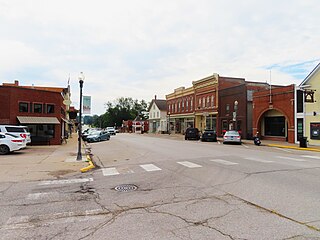
West Branch is a city in Cedar and Johnson counties in the U.S. state of Iowa. The population was 2,509 as of the 2020 census. It is the birthplace of the only American president born in Iowa, Herbert Hoover.
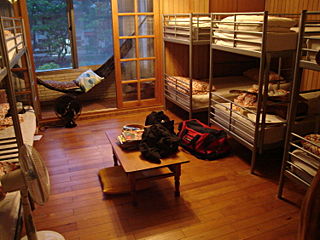
A hostel is a form of low-cost, short-term shared sociable lodging where guests can rent a bed, usually a bunk bed in a dormitory sleeping 4–20 people, with shared use of a lounge and usually a kitchen. Rooms can be mixed or single-sex and have private or shared bathrooms. Private rooms may also be available. Hostels are popular forms of lodging for backpackers, however very few impose age limits, so hostels are an option for travellers of all ages and styles. The benefits of hostels include lower costs and opportunities to meet people from different places, find travel partners, and share travel experiences. Some hostels, such as in India or Hostelling International, cater to a niche market of travelers. Different hostels can be known for offering different experiences. For example, one hostel might feature in-house social gatherings such as movie nights or communal dinners, another might feature local tours, one might be known for its parties, and another might have a quieter place to relax in serenity, or be located on the beach. Newer hostels focus on a more trendy design, some of which are on par with boutique hotels. Some may cater to older digital nomads, global nomads, and perpetual travelers who prefer slightly more upmarket private rooms or a quieter atmosphere. Hostels may also differentiate themselves by being environmentally friendly ecohostels. In countries where wages are lower, the cost of staying at a hostel may be similar to staying in a budget hotel.

Earlham College is a private liberal arts college in Richmond, Indiana. The college was established in 1847 by the Religious Society of Friends (Quakers) and has a strong focus on Quaker values such as integrity, a commitment to peace and social justice, mutual respect, and community decision-making.

The Kindertransport was an organised rescue effort of children from Nazi-controlled territory that took place in 1938–1939 during the nine months prior to the outbreak of the Second World War. The United Kingdom took in nearly 10,000 children, most of them Jewish, from Germany, Austria, Czechoslovakia, Poland, and the Free City of Danzig. The children were placed in British foster homes, hostels, schools, and farms. Often they were the only members of their families who survived the Holocaust. The programme was supported, publicised, and encouraged by the British government, which waived the visa immigration requirements that were not within the ability of the British Jewish community to fulfil. The British government placed no numerical limit on the programme; it was the start of the Second World War that brought it to an end, by which time about 10,000 kindertransport children had been brought to the country.
George School is a private Quaker boarding and day high school located on a rural campus in Middletown Township, Bucks County, Pennsylvania. It has been at that site since its founding in 1893, and has grown from a single building to over 20 academic, athletic, and residential buildings. Besides the usual college preparatory courses, including an International Baccalaureate program, the school features several distinct programs deriving from its Quaker heritage. These include community service requirements, an emphasis on social justice and environmental concerns, required art courses, and community-based decisionmaking.
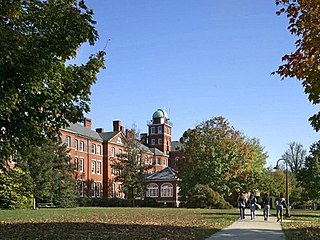
Westtown School is a Quaker, coeducational, college preparatory day and boarding school for students in pre-kindergarten through twelfth grade, located in West Chester, Pennsylvania, United States, 20 miles west of Philadelphia. Founded in 1799 by the Religious Society of Friends.

Sandy Spring Friends School (SSFS) is a progressive, coeducational, college preparatory Quaker school serving students from preschool through 12th grade. SSFS offers an optional 5- and 7- day boarding program in the Middle School and Upper School. 59% of its student body identifies as students of color, and 19 countries are represented in its boarding program. Founded in 1961, its motto is "Let Your Lives Speak" an old Quaker adage which expresses the school's philosophy of "educating all aspects of a person so that their life—in all of its facets—can reveal the unique strengths within." SSFS sits on a pastoral 140-acre campus in the heart of Montgomery County, Maryland, approximately midway between Washington, D.C., and Baltimore. SSFS is under the care of the Sandy Spring Monthly Meeting and the Baltimore Yearly Meeting.

Friends School of Baltimore is a private Quaker school in Baltimore, serving students in pre-kindergarten through 12th grade.

Abington Friends School is an independent Quaker school in Abington Township, Montgomery County, Pennsylvania, United States, with a Jenkintown postal address. Serving students from age 3 to grade 12, Abington Friends School has stood on its original campus since 1697, and is the oldest primary and secondary educational institution in the United States to operate continuously at the same location under the same management. The school draws students from approximately 75 ZIP codes around the greater Philadelphia area, as well as international students from many regions of China.
Olney Friends School is a small, co-educational boarding and day school affiliated with the Religious Society of Friends (Quakers). Located in the foothills of the Appalachian Mountains in Barnesville, Ohio, the school "challenges students to grow, celebrates intellectual vigor, provokes questions of conscience, and nurtures skills for living in community." Students come from around Ohio, around the country, and around the world to study the college prep curriculum. Currently (2017-2018), the school is attended by 53 students from 14 US states and 10 countries.

After Adolf Hitler came into power in 1933 and enacted policies that would culminate in the Holocaust, Jews began to escape German-occupied Europe and the United Kingdom was one of the destinations. Some came on transit visas, which meant that they stayed in Britain temporarily, while waiting to be accepted by another country. Others entered the country by having obtained employment or a guarantor, or via Kindertransport. There were about 70,000 Jewish refugees who were accepted into Britain by the start of World War II on 1 September 1939, and an additional 10,000 people who made it to Britain during the war.

The Friends School of Minnesota (FSMN) is a Kindergarten through Eighth Grade (K-8) independent school located in Saint Paul, Minnesota, United States. The school was founded in 1988 by area Quakers and peace activists with the goal of meeting "children’s intellectual, emotional and spiritual needs in an environment that nurtures their social consciousness." FSMN is fully accredited through the Independent Schools Association of the Central States
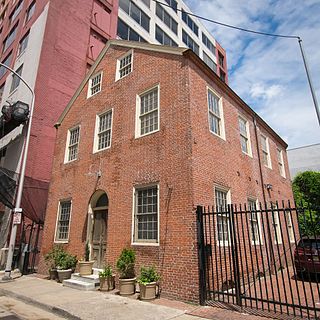
The Adelphi School was a Quaker-organized school for poor children that operated between 1808 and 1906 in what is now the Chinatown neighborhood of Philadelphia's Center City. Originally founded to educate white boys during its first several years, it shifted focus to educating black children after the public education system was established in Pennsylvania. The Adelphi School was sustained through charitable donations, at no cost to its students. The building that housed the school beginning in 1832 is thought to be Philadelphia's "last surviving example of a free school building". It was listed on the National Register of Historic Places in 1978.
The Woolman Semester was a semester school focused on the intersections of peace, social justice, and sustainability. The school operated from the Spring of 2004 through the Spring of 2016.

Anna Essinger was a German Jewish educator. At the age of 20, she went to finish her education in the United States, where she encountered Quakers and was greatly influenced by their attitudes, adopting them for her own. In 1919, she returned to Germany on a Quaker war relief mission and was asked by her sister, who had founded a children's home, to help establish a school with it. She and her family founded a boarding school, the Landschulheim Herrlingen in 1926, with Anna Essinger as headmistress. In 1933, with the Nazi threat looming and the permission of all the parents, she moved the school and its 66 children, mostly Jewish, to safety in England, re-establishing it as the Bunce Court School. During the war, Essinger established a reception camp for 10,000 German children sent to England on the Kindertransports, taking some of them into the school. After the war, her school took many child survivors of Nazi concentration camps. By the time Essinger closed Bunce Court in 1948, she had taught and cared for over 900 children, most of whom called her Tante ("Aunt") Anna, or TA, for short. She remained in close contact with her former pupils for the rest of her life.
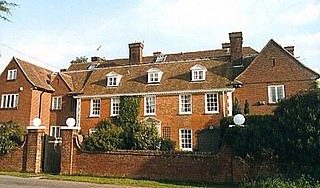
The Bunce Court School was an independent, private boarding school in the village of Otterden, in Kent, England. It was founded in 1933 by Anna Essinger, who had previously founded a boarding school, Landschulheim Herrlingen in the south of Germany, but after the Nazi Party seized power in 1933, she began to see that the school had no future in Germany. She quietly found a new home for the school and received permission from the parents of her pupils, most of whom were Jewish, to bring them to safety in England. The new school was called New Herrlingen School, but came to be known as Bunce Court. The school closed in 1948. Alumni, who sometimes stayed on at the school even after finishing, were devoted to the school and organized reunions for 55 years. They have referred to its "immense effect" on their lives, as "Shangri-La" and to being there as "walking on holy ground".
The Friends Relief Service (FRS) was a voluntary humanitarian relief organisation formally established by a committee of Britain Yearly Meeting in November 1940. Largely staffed by pacifists and conscientious objectors, its aim was to provide humanitarian relief and social welfare to civilians affected by World War II. Key areas of operation included British cities affected by The Blitz, and refugee camps throughout north-west Europe, the Balkans and the Middle-East. One of its teams was also amongst the first humanitarian groups to reach Bergen-Belsen concentration camp. The organisation had three changes of name: Friends War Victims Relief Committee (November 1940 - February 1942); Friends War Relief Service (February 1942 - September 1943) and the Friends Relief Service (September 1943 - May 1948). The FRS was closed down on May 29, 1948.














